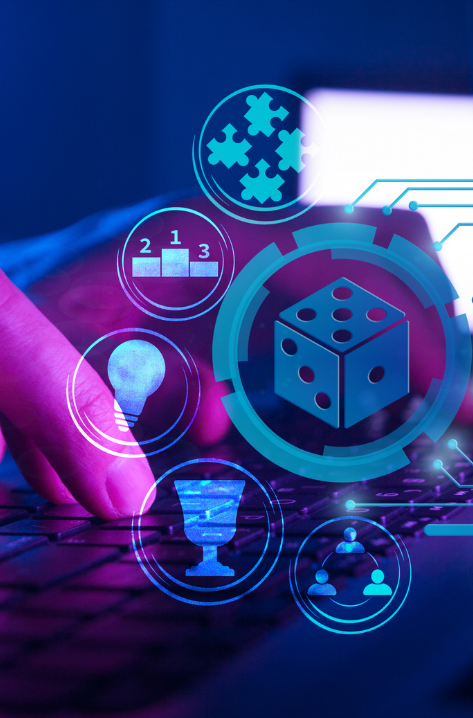The Ethics of Gamification in the Workplace
The effectiveness of ethics compliance training in workplaces is often limited due to low interactivity and mandatory formats. Gamification offers an effective method to address this issue. By adding game elements to the training process, it increases employee engagement and enables them to internalize ethical values through experience. Gamification enhances motivation, boosts productivity, and strengthens corporate culture, thereby promoting ethical awareness and behavioral change.
30.10.2025

In today’s corporate landscape, organisations are evaluated not only on their financial assets but also on the importance they attach to ethical values and social responsibility. In this context, ethics compliance programmes have thus become essential tools for shaping employee conduct in alignment with organisational policies and preventing potential ethical risks.
However, an examination of current practices reveals that most of these programmes are knowledge transfer-based, low-interaction, and conducted in a mandatory training format.
This approach often results in formal participation among employees; it limits internalised ethical awareness, the permanence of learning and behavioural change. At this point, the gamification approach stands out as an innovative and effective learning strategy for enhancing ethical compliance training.[1]
The Basis of Gamified Trainings
Throughout history, games have been an important tool in individuals' learning, discovery and socialisation processes. According to Vygotsky's concept of the “zone of proximal development”, games provide an interactive environment that expands an individual's potential learning level. In this respect, games are not merely entertainment; they are an experience that integrates cognitive, emotional and social learning.[2]
Based on this understanding, gamification aims to increase participation and motivation by using game elements in non-game contexts, particularly in educational and work environments. Unlike game-based learning, it enriches existing processes with game mechanics (such as points, levels, badges, leaderboards, tasks, storytelling, instant feedback, etc.) rather than creating a new game. These elements make the learning process more engaging by creating a sense of progress, competition, curiosity and achievement in the individual.[3]
In corporate learning, gamification unites cognitive, emotional, and behavioural learning dimensions. Particularly in ethics and compliance training, this approach ensures that employees not only acquire knowledge but also internalise ethical values through experience.
Employees can experience ethical dilemmas in a safe environment through gamified scenarios, see the consequences of their decisions, and deepen their awareness.[4]
Integrating Gamification into Ethics and Compliance Training
The effectiveness of gamification in education is fundamentally based on the fact that learning is as much an emotional process as it is a cognitive one. The human brain responds strongly to emotional stimuli during learning, which directly affects processes such as attention, problem solving and memory. Gamification elements trigger these emotional responses in the learning environment, increasing participation and knowledge retention rates. Research shows that learning is more enduring when emotional systems such as ‘curiosity,’ ‘desire to succeed,’ and ‘play instinct’ are activated. Therefore, gamification transforms learning from a mere transfer of information into an emotionally meaningful and experiential process; this facilitates the internalisation of values learned, particularly in ethics and compliance training.
Organizations that adopt gamification in corporate training gain a measurable advantage in employee engagement, learning retention and behavioural transformation compared with those using traditional methods.
Studies shows that gamified training and onboarding programmes increase employee engagement by approximately %60. Growth Engineering's 2023–2025 data further reveal that gamification increases workplace engagement by %48, with %72 of employees reporting higher motivation.[5]
Employees in companies using gamified systems are also %69 more likely to remain with the company for more than three years.[6]
Moreover, %83 of employees involved in gamified training report feeling more motivated and %90 note improvements in productivity.[7]
A study conducted by Harvard and Columbia Business School found that implementing gamified education systems produced measurable business outcomes, including a %35,8 increase in collections, a %35,8 rise in customer numbers, and a %35,8 growth in new customer opportunities.[8]
These findings clearly demonstrate that gamification is not merely an entertaining method; it is strategic mechanism that enhances learning processes, sustains motivation, and reinforces ethical behaviour across organisations[9]
Conclusion
Gamification transforms compliance training from mere knowledge transfer into a dynamic learning model where employees actively participate and internalise values through experience. When effectively designed, gamification strengthens an organisation's compliance culture, makes learning an enjoyable experience, and helps employees manage risks more consciously.
This approach simultaneously nurtures motivation, awareness, and behavioural retention, ensuring the sustainability of training quality. In short, gamification is not merely a training technique; it is a strategic transformation tool that brings ethical values to life, makes learning meaningful, and deepens an organisation's culture of trust.
References
Cai, W. (2023, 09 07). Playing for Excellence? How Gamified Training Impacts Employee Performance. Retrieved from Columbia Business School: https://business.columbia.edu/research-brief/playing-excellence-how-gamified-training-impacts-employee-performance?utm_source=
Cavaney, L. (2025, 09 09). Gamification Statistics You Need For 2026. Retrieved from Build Empire: https://buildempire.co.uk/gamification-statistics/?utm_source=
Cloke, H. (2023, 05 27). 19 Gamification Trends for 2023-2025: Top Stats, Facts & Examples. Retrieved from Growth Engineering: https://www.growthengineering.co.uk/19-gamification-trends-for-2022-2025-top-stats-facts-examples/?utm_source=
Cowlishaw, R. (2025, 06 02). 25+ Gamification Statistics You Need to Know in 2025. Retrieved from AmplifAI: https://www.amplifai.com/blog/gamification-statistics?utm_
Garcia, B. (2025, 03 18). 10 Gamification Statistics and Trends for 2025. Retrieved from SC Training: https://training.safetyculture.com/blog/gamification-statistics/?utm_source=
Hatipoğlu, H. N., & Türker, M. V. (n.d.). (Only in Turkish) Oyunlaştırma Uygulamalarının, İnsan Kaynakları Yönetiminin Teknik Kapsamında Kullanılmasının Algılanan Başarısı Üzerine Bir Araştırma. Marmara Üniversitesi Öneri Dergisi, 17(57), pp. 174-209. Retrieved from DergiPark: https://dergipark.org.tr/en/download/article-file/1754394?utm_
Khaldi , A., Bouzidi , R., & Nader , F. (2023, 01 31). Gamification of E-learning in Higher Education: A Systematic Literature Review. Retrieved from National Library of Medicine: https://pmc.ncbi.nlm.nih.gov/articles/PMC9887250/?utm_source=
Li, L., Hew , K. F., & Du , J. (2024, 01 16). Gamification Enhances Student Intrinsic Motivation, Perceptions of Autonomy and Relatedness, but Minimal Impact on Competency: A Meta-analysis and Systematic Review. Retrieved from Springer Nature Link: https://link.springer.com/article/10.1007/s11423-023-10337-7?utm_source=
Triantafyllou, S. A., Georgiadis, C., & Sapounidis, T. (2025, 04 16). Gamification in Education and Training: A Literature Review. Retrieved from Springer Nature Link: https://link.springer.com/article/10.1007/s11159-024-10111-8?utm_source=
-
Kemal Altuğ Özgün
Managing Partner

-
Beste Bayrak
Associate




